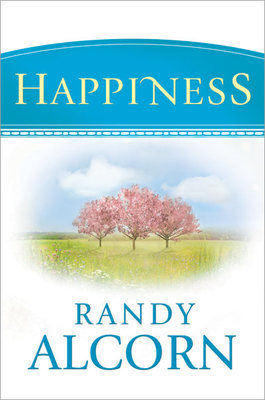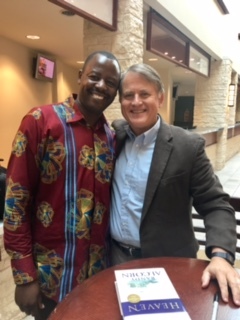Randy Alcorn's Blog, page 127
October 13, 2017
How Do Most People Respond to What You’ve Written About Happiness?

I find that most Christians are surprised but open to these ideas about happiness, including that God is a happy God and offers us His own happiness. Yet some remain doggedly determined to believe and teach that God doesn’t want His children happy and happiness is inherently wrong. This is so strange, because what loving father doesn’t want his children full of joy and happiness, in the right sense?
In many cases believers respond to my books on the subject as I would respond to others who’ve adopted a modern feel-good message that is contrary to Scripture, such as universalism or the concept that there is no hell.
Because they’ve heard in Bible teaching churches that God wants us to be holy, not happy, and because they’ve read favorite Christ-centered writers who have said this, they conclude that the concept God is happy and that He wants His children happy is a modern idea that is really a heresy.
 That’s why in the comprehensive Happiness book I spent so much time developing the theme of English-speaking Christians throughout history, back to the Puritans, regularly affirming that God is happy, wants us happy, and that holiness and happiness are ultimately inseparable. The anti-happiness mentality in the church has developed only in the last century, and it was a departure from what God’s people widely believed before that. While it did have some good intentions, namely to keep people from pursuing happiness in sin, I think it really backfired.
That’s why in the comprehensive Happiness book I spent so much time developing the theme of English-speaking Christians throughout history, back to the Puritans, regularly affirming that God is happy, wants us happy, and that holiness and happiness are ultimately inseparable. The anti-happiness mentality in the church has developed only in the last century, and it was a departure from what God’s people widely believed before that. While it did have some good intentions, namely to keep people from pursuing happiness in sin, I think it really backfired.
The irony is that this is actually a feel-good message that conforms to Scripture! It truly is good news, what Isaiah 52:7 calls the “good news of happiness” and what Luke 2:10 says is “good news of great joy that will be for all the people.”
It reminds me of the people who‘ve not heard about the biblical concept of the resurrection and the New Earth, and don’t understand what that entails and implies. They read my Heaven book and other things and conclude, “I’ve never heard this in my church, so it can’t be true.” When I talk about eating and drinking, and celebrating and culture and arts and music and learning, and likely even sports on the New Earth, they think, “Here we go again, another feel-good heresy.”
Yes, we are right to oppose any message, feel-good or otherwise, that is opposed to God’s Word. But ironically, we cling to certain false doctrines believing them to be orthodox, including the concept of a ghostly afterlife for all eternity, and the notion that God doesn’t want us to be happy. The true biblical teachings on these subjects draw people toward the Bible and the Christian faith; the false ones push them away.
It’s true the Bible teaches some hard things that people are prone to reject, and we dare not apologize for these. But how ironic that we take some wonderful things the Bible teaches and then seemingly work overtime to deny them or make them seem unattractive!
It’s like we think the spiritual high ground is to portray the Christian faith as negatively and stoically as possible, so as not to succumb to what so many are doing which perverts the gospel of Jesus to make it palatable.
But think of the promises of Jesus to set us free (John 8:32, Galatians 5:1, Revelation 5:1), to give us abundant life (John 10:10), and to enjoy Heaven and the New Earth as resurrected people forever while being delivered from the hell we deserve (Revelation 21–22). That part of Scripture is actually a feel-good message, and it's also true! If the “good news” of Jesus doesn't make us happy, we aren’t understanding what good news actually means.
For more on happiness, see Randy’s books Happiness and God’s Promise of Happiness, the devotional 60 Days of Happiness, and his DVD series Happiness 101.
Photo by Priscilla Du Preez on Unsplash
October 11, 2017
Prosperity Theology Tells Us to Live Now as Kings, Not Servants

I’ve written in my books (including Managing God’s Money and Money, Possessions, and Eternity) and on my blog about the false doctrine of prosperity gospel. This philosophy teaches that the more money you give away, the wealthier you will become. Following God through giving and other forms of obedience becomes a formula for abundant provision and the celebration of prosperous living. This is, in essence, a Christianized materialism.
In this video, I talk about how such teaching is from the pit of hell.
See also “The Poison of Prosperity Gospel”, which includes a video with words full of truth from John Piper.
In Philippians 3, the apostle Paul discusses his credentials of success, his diplomas, and awards. These he once highly valued, but now he says, “Whatever was to my profit I now consider loss for the sake of Christ. What is more, I consider everything a loss compared to the surpassing greatness of knowing Christ Jesus my Lord, for whose sake I have lost all things. I consider them rubbish, that I may gain Christ” (Philippians 3:7-8). Actually, this translation is too delicate. Paul did not call his credentials and possessions “rubbish,” but dung. Excrement. That’s how he viewed the things he once valued, when stacking them up against Christ. Contrast that with today’s prosperity preachers, their heavy jewelry swaying as they strut across the stage.
As a result of following Christ, Paul lost everything. What little money and possessions might have passed through his hands he considered a loss. He describes his daily adversity, persecution for Christ, and nearness to death (2 Corinthians 4:7-12). Later Paul refers to his troubles, hardships, distresses, beatings, imprisonments, riots, sleepless nights, and hunger, as well as the experience of nearly dying, and being sorrowful and poor (2 Corinthians 6:3-10, 11:23-29).
Paul seems to make a case for what might be called “adversity theology,” or the “sickness and poverty gospel.” I wonder if in his dreams the apostle ever heard a faint chorus of voices from the future saying, “Paul, you don’t have to live like this—why don’t you trust God and live like a king’s kid?” The truth is, Paul heard some of these voices in his own day. In fact, Paul had to defend himself against the “super apostles,” well-off ministers who berated him because he couldn’t claim their wealth and prestige (1 Corinthians 4:8-13). He says to them, “Already you have all you want! Already you have become rich! You have become kings” (1 Corinthians 4:8). He adds, “We are weak, but you are strong! You are honored, we are dishonored!” (1 Corinthians 4:10).
Paul faced off with these prosperity preachers, pointing out that they’d jumped the gun on reigning with Christ by living now as kings rather than as servants. Paul’s point is clear: Don’t try to reign prematurely! Dress like a servant. Let God put robes of honor on you when He brings you to His kingdom. Don’t put them on yourself now!
Trillia Newbell posted this recently on Twitter: “I’ve never cried over a tweet, until today. 2.7 million people potentially saw this falsehood. This is why we preach the gospel:” She followed with the tweet: “If you obey GOD you will never be broke another day in your life.” T.D. Jakes #anditcametopass
Many responders to Trillia’s post, and to others who retweeted it, seemed perplexed, and some were even angry. A number of them asked, what was her problem with what T.D. Jakes said? That they would even ask shows us how deeply rooted in our thinking the health and wealth gospel can become.
Christianity Today recently published an article written by Costi Hinn (the nephew of faith healer Binny Hinn) about being freed from the clutches of the prosperity gospel and false teaching. It’s well worth reading:
Benny Hinn Is My Uncle, but Prosperity Preaching Isn’t for Me
Almost 15 years ago, on a shoreline outside of Athens, Greece, I stood confident in my relationship with the Lord and my ministry trajectory. I was traveling the world on a private Gulfstream jet doing “gospel” ministry and enjoying every luxury money could buy. After a comfortable flight and my favorite meal (lasagna) made by our personal chef, we prepared for a ministry trip by resting at The Grand Resort: Lagonissi. Boasting my very own ocean-view villa, complete with private pool and over 2,000 square feet of living space, I perched on the rocks above the water’s edge and rejoiced in the life I was living. After all, I was serving Jesus Christ and living the abundant life he promised.
Little did I know that this coastline was part of the Aegean Sea—the same body of water the apostle Paul sailed while spreading the gospel of Jesus Christ. There was just one problem: We weren’t preaching the same gospel as Paul.
Photo: Pixabay
October 9, 2017
Why I Signed a Statement in Defense of the DACA Dreamers

In August I signed the Nashville Statement about marriage, addressing gender issues and homosexual marriage. While controversial and perhaps in some parts imperfectly worded, I still believe that was the right thing to do.
Recently I also signed an Evangelical Leader Statement of Principles on Dreamers, which focuses on encouraging solutions for those in the now rescinded DACA program. The Deferred Action for Childhood Arrivals, approved under the Obama administration, was for 800,000 immigrants who entered the country illegally as minors and have no criminal records. The program, which was simply a stopgap and never a permanent solution, gave these children who’ve grown up in the U.S. and want to make something of their lives a chance to get an education and remain in the country. DACA was rescinded by the Trump administration in September.
The Dreamers and DACA
Here’s more explanation from the ERLC (Ethics & Religious Liberty Commission of the Southern Baptist Convention) about the Dreamers, and DACA:
The term “Dreamers” (sometimes DREAMers) refers to young undocumented immigrants who would qualify under the DREAM Act for permanent residency in the United States. The DREAM Act (an acronym for Development, Relief, and Education for Alien Minors) is proposed federal legislation that would provide permanent resident status on a conditional basis for certain long-term residents who entered the U.S. as children.
Even though the DREAM Act was never passed, the term “Dreamers” is still sometimes used to describe young undocumented immigrants who were brought to the United States as minors, are pursuing or have pursued education, and have never been convicted of felonies or multiple misdemeanors.
Frustrated by the failure of Congress to pass the DREAM Act, President Obama implemented in 2010 through executive fiat the Deferred Action for Childhood Arrivals (DACA).
Deferred action is a use of prosecutorial discretion in immigration cases to defer removal action against an individual for a certain period of time. President Obama directed the Department of Homeland Security to consider request for deferred action for certain people who came to the United States as children and met qualifications similar to the DREAM Act. (This is why people who qualify for DACA are sometimes referred to as “Dreamers.”)
The ERLC has always called for a legislative fix to this problem and disagreed with President Obama’s decision to act unilaterally. But regardless of whether we feel the executive order should have been issued in the first place, thousands of young immigrants who are paying taxes and contributing to their communities stepped forward in good faith to correct a legal situation for which they should not be held responsible. They should be rewarded, rather than punished, for their attempt to comply with the law.
Read more on the Dreamers here.
Encouraging Legislative Action
Personally, I love to see evangelicals coming out not only against what we believe is wrong, but also in defense of minorities and advocating for giving a chance to the children of illegal immigrants who were promised something by our country. (See Evangelical leaders call for help for Dreamers.)
I too think President Obama and President Trump should not have made, nor make, unilateral decisions altering public policy, but when this is done we need to try our best to be just and fair in resolving them.
Here’s an excerpt from the statement I signed, explaining more about its aim of encouraging legislative action:
We support the underlying policy aim of DACA because we believe this is a special category of immigrants who are not legally culpable, who in most cases have no home other than the United States, and who are a blessing to their communities and to their churches. At the same time, many of us shared a skepticism about the prudence of accomplishing the aim solely through temporary action of the Executive Branch. Indeed, the reversal of this policy and the uncertainty created for existing DACA recipients prove that a proper solution requires legislative action.
Biblically understood, a just system of law always has in view human flourishing. We advocate for change to particular laws when needed because of our respect for the rule of law. Many of us have participated in our nation’s debate over immigration policy reform for well over a decade, and these conversations within our churches about the national immigration crisis have produced significant consensus among members of our churches and communities.
We now call on Congress for a timely solution on a narrow issue of national consensus: provide a legal remedy for the subset of undocumented immigrants who were brought to the United States as children by their parents, those immigrants commonly called Dreamers.
The statement focuses on six basic principles:
We believe it is unjust to punish children for offenses they did not commit.
We believe America’s borders must be secure.
We believe we should welcome Dreamers of good moral character and who are working hard to contribute to our country.
We believe Dreamers deserve to be recognized as our fellow Americans.
We believe our government should provide a pathway to permanent legal status and/or citizenship for eligible Dreamers.
We believe a just government works to maintain the integrity of families.
Read the whole statement here. I appreciated the opportunity to sign this letter, not only to make a statement about what I believe is right and God-honoring, but also because I am alert to the situations of some of these young people as a result of being in the process of becoming a mentor for minority students who aspire to go to college. One of the students they asked me to consider working with is a gifted writer and also a Dreamer, and now he fears he will be deported and unable to go to a high-quality college he’s already been accepted at.
What God’s Word Says about Sojourners
I think many people, sometimes unfairly and sometimes not, perceive evangelicals as against hope and opportunity for these young Dreamers who have much to gain but also much to contribute to our country. Christians are routinely accused of only caring about abortion and homosexuality, and not caring enough about already born people, including the poor and needy and immigrants. This accusation may be true in some cases, and we must all be ready to ask the Lord what more we can do to help people in His name. (Of course in many cases, people concerned about abortion and moral issues are the very same people who open their homes to provide foster care, adopt, and give financially to help the impoverished and the needy, including victims of the many recent natural disasters.)
Scripture has much to say about caring for aliens and sojourners. What follows does not mean America cannot and should not have carefully-governed immigration policies or border control. I actually think we should. But I also think supporting the Dreamers is the sort of limited but meaningful effort that could honor God by helping people and at the same time not put our country at risk. Putting politics and pragmatics aside just for the moment, please allow these passages to speak to your heart:
“The same law will apply to both the native and the alien who resides among you” (Exodus 12:49).
“Moses had said, ‘I have been a resident alien in a foreign land’” (Exodus 18:3).
“You must not exploit a resident alien or oppress him, since you were resident aliens in the land of Egypt” (Exodus 22:21, CSB).
“You must not oppress a resident alien; you yourselves know how it feels to be a resident alien because you were resident aliens in the land of Egypt” (Exodus 23:9, CSB).
“He executes justice for the fatherless and the widow, and loves the sojourner, giving him food and clothing. Love the sojourner, therefore, for you were sojourners in the land of Egypt” (Deuteronomy 10:18-19).
“Thus says the Lord: Do justice and righteousness, and deliver from the hand of the oppressor him who has been robbed. And do no wrong or violence to the resident alien, the fatherless, and the widow, nor shed innocent blood in this place” (Jeremiah 22:3).
“Do not oppress the widow, the fatherless, the sojourner, or the poor, and let none of you devise evil against another in your heart” (Zechariah 7:10).
Scriptures like these remind us there is more we all can do to help needy and vulnerable people, both around the world and in our communities. One place to start might be by signing this letter I and others have signed, and sharing it with your sphere of influence. And let’s all pray for a real solution for these Dreamers, who are real individuals with real stories and hopes and ambitions.
Following Jesus Wherever His Teachings Take Us
I am well aware that some of the people who were outraged that I signed the Nashville Statement will be pleased that I signed this statement on the Dreamers. I also realize that some who were pleased I signed the Nashville Statement will be bothered that I signed this one.
The truth is, life is much easier when your goal is to be consistent with a political philosophy, whether that’s conservativism or liberalism. But easier does not mean right. I believe that we as Christ-followers should never put our conservativism or liberalism above our mandate to follow Jesus. If I believe my position and action on a particular issue is consistent with the character and teachings of Jesus, who is full of both truth and grace, I should not care whether I am siding with conservatives or liberals. If my goal is to please conservatives or liberals, then I am not a servant of Jesus (to paraphrase Galatians 1:10). No political philosophy redeems us—only Jesus does that.
I say this because I am often stereotyped by liberals as being an uncaring conservative because I oppose abortion (as if not wanting children to die or women to be exploited and hurt is being uncaring). And I am sometimes stereotyped by conservatives for being a bleeding heart liberal for taking seriously the notion that racism and racial injustice is sometimes still a problem in America.
If you’d like to understand better my perspectives on the idea that conservatives and liberals are both sometimes right and sometimes wrong, see my article “Conservative, Liberal or Christian?” In it, I explain why it shouldn’t matter to us as Jesus-followers whether we “look conservative” or “look liberal” on any issue, only that we follow our King wherever His teachings and example take us.
Related books by Randy Alcorn: Truth: A Bigger View of God’s Word, Grace: A Bigger View of God’s Love, and The Grace and Truth Paradox.
Photo by Samuel Schneider on Unsplash
October 6, 2017
Recent Interviews about Heaven, from Two Christ-Centered Churches in Texas
I recently got back from a trip to Texas, where I spoke at two churches and at a fiction writers’ conference.
 I enjoyed speaking in Plano at First Baptist Prestonwood, a mega-church that is Bible-based and Jesus-centered. I thank God for Jack Graham and the other pastors and staff. In this picture taken there, I’m with Pastor Johnson Bakashaba, who has a ministry in Uganda, and who was excited to read Heaven.
I enjoyed speaking in Plano at First Baptist Prestonwood, a mega-church that is Bible-based and Jesus-centered. I thank God for Jack Graham and the other pastors and staff. In this picture taken there, I’m with Pastor Johnson Bakashaba, who has a ministry in Uganda, and who was excited to read Heaven.
I also enjoyed having lunch with some extended family in the church restaurant. (Yes, I said the church restaurant. It’s huge and the food is amazing.)
Here’s the service from Prestonwood, an interview about Heaven. (The interview starts at the 52 1/2 minute mark.)
This was my first time at Church at the Cross in Grapevine, with my friend JR Vassar. I love that church, another body of believers bringing Jesus to their community.
Here’s the service, also focused on Heaven.
I also really enjoyed my time with ACFW, the American Christian fiction writers’ conference. I have many long-time friends who are fiction writers that I rarely get to see, and it was a great joy to be with them and laugh and reminisce and catch up, as well as to meet new writers.
Several of us “old friends” shared a meal together before the conference began:

It was a great and productive trip, but after nine days it was so good to get back to Nanci and our Golden Retriever Maggie. It was also very fun to get back to watch my grandsons play football!
October 4, 2017
The Problem of Evil and Suffering in Las Vegas and Elsewhere

Words are sadly inadequate as a response to all the recent natural disasters, and this week we had to face the added dimension of human evil in the Las Vegas murders. This isn’t the first time, and won’t be the last, that we who are Jesus-followers either ask or are asked by others, “How can a good and loving God allow such tragedies?”
When tragedies come, our thinking may quickly become confused, even distorted. In this eight-minute video interview with Greg Laurie, I share a perspective on suffering when we’re in the very thick of it.
You cannot resolve the problem of evil and suffering in this lifetime. Present suffering must be seen in light of the promises of God in eternity. Here’s a five-minute video where I explain this further.
We wonder, “Why doesn’t God do more to restrain evil and suffering?” Severe suffering seems unacceptable to us because we’re unaccustomed to it, and also because we draw wrong conclusions about God. I personally believe God restrains the great majority of evil and suffering that we would have to face in this world without His intervention. Here are further insights in two parts:
Even when the pain seems pointless, we can still learn to trust God.
I appreciated this article from Desiring God: One Day Never Again (May Heaven Fall on Las Vegas)
One late-night television host lamented that “this shooting feels like someone has opened a window into hell.” He’s tapped into at least one truth—the evil prince of darkness certainly had a hand in this tragedy. But God does not turn His back on hurting people. He sees. He knows. When Hagar tried to flee trouble, the Lord spoke to her and she recognized Him as “the God who sees” (Genesis 16:13).
Song-writer Jeremy Camp put it this way: “We may faint and we may sink; Feel the pain and near the brink; But the dark begins to shrink when you find the One who knows…Every hurt and every sting; He has walked the suffering; He knows.”
God’s Word has much to say on suffering because He experienced the greatest suffering imaginable on the cross for you and for me. I can’t think of a better way to end than to share Scripture to meditate on:
"We have suffered terror and pitfalls, ruin and destruction. Streams of tears flow from my eyes because my people are destroyed" (Lamentations 3:47-48).
"I called on your name, O Lord, from the depths of the pit. You heard my plea: 'Do not close your ears to my cry for relief.' You came near when I called you, and you said, 'Do not fear'" (Lamentations 3:55-57).
"Blessed are those who mourn, for they will be comforted" (Matthew 5:4).
"He heals the brokenhearted and binds up their wounds" (Psalm 147:3).
"When I am afraid, I put my trust in you" (Psalm 56:3).
"Cast your cares on the Lord and he will sustain you; he will never let the righteous be shaken" (Psalm 55:22).
"Do not be overcome by evil, but overcome evil with good" (Romans 12:21).
Further resources that might be helpful:
If God Is Good, Why Do We Hurt?
October 2, 2017
Clothing Yourself in Humility Will Please Christ and Bring You Happiness

Here are some thoughts on how God values humility and what it looks like, based on 1 Peter 5:5-6:
All of you, clothe yourselves with humility toward one another, because, “God opposes the proud but shows favor to the humble.” Humble yourselves, therefore, under God’s mighty hand, that he may lift you up in due time.
Humility isn’t pretending that we’re unworthy because it’s the spiritual thing to do; it’s recognizing that we’re unworthy because it’s simply true. We are sinners who deserve judgment and don’t deserve God’s grace.
Trevin Wax says, “Hell is full of people who think they deserve heaven. Heaven is full of people who know they deserve hell.”
The prodigal son left in pride and returned in humility. After he lost everything, he decided to go back and say to his father, “I am no longer worthy to be called your son; make me like one of your hired men” (Luke 15:19). His father ran to him and threw his arms around him. That’s how God responds to humility.
Our True Condition
Pride pushes us away from God; humility draws us toward God. By choosing humility, we agree with God about our true condition and our true need for Christ.
We need Christ today just as much as we did the day we came to faith in Him. That’s a humbling truth we should never forget. No matter how self-sufficient we imagine ourselves to be, we are all perpetually needy.
“God opposes the proud but gives grace to the humble” (1 Peter 5:5). Do we want God’s opposition or do we want His grace? According to this verse, acting proudly is like wearing a sign before God that says “go ahead and oppose me.” That’s a prayer He’s certain to answer. And the last person in the universe I want to oppose me is God!
Humility wears the sign “give me grace,” which is a prayer God is always happy to answer.
While pride twists and destroys us, humility preserves and protects us. Every day, every hour, often unconsciously, we choose either to humble ourselves or to be proud. Since pride tends to be our default condition, humility requires deliberate, intentional action.
We’re told to “clothe ourselves with humility toward one another.” Your clothes don’t magically appear on your body. You have to choose to put them on, and actually follow through. Humility won’t magically happen—you need to choose to take the time and effort to clothe yourself with humility.
A Test of Humility
For me, a major test of humility is how I treat my wife and also those in positions of service I encounter throughout my day, such as meal servers and gas station attendants and those who work at our ministry. A couple of weeks ago while I was traveling, it included hotel staff and flight attendants and the young guys driving me to the churches and conferences I was speaking at.
Even when we’re tired, how we treat those who serve us, and the respect we show them, is a test of humility and Christlikeness.
Speaking now specifically to men—for those of us who are married, our wives do so much for us and for our families. Even when you come home exhausted, still making an effort to serve your wife is huge. So ask her how her day was, genuinely listening, and helping her by doing something for her. Take time with your kids by listening to them, praying with them, and reading Scripture and Bible-based stories. Those things are precious. Serving them that way will mean the world to them, and in the long run to you also.
So as I was first writing this, while I was out of town, I was thinking and praying about what more I can do to serve my wife, and resolving to do it. (In fact, I did one small thing; I stopped to order flowers to be delivered, with a note that the occasion was “just because you’re you, and I love you so much.”)
The Stupidity of Pride, the Happiness of Humility
Here’s one major take-away for me from God’s Word about pride and humility in 1 Peter 5 and elsewhere: Being proud isn’t just wrong, it’s stupid. We’ll pay a terrible price for it, in damaged relationships and other ways. Being humble isn’t just right; it’s smart. It will not only please God and others, but it will also pay off for us, we’ll be happier and more at peace knowing God is using us to serve others.
If we don’t humble ourselves, God will humble us. If we do humble ourselves, “God will lift us up, in due time.”
Jesus, who washed the feet of His disciples, said, “The Son of Man did not come to be served, but to serve, and to give his life as a ransom for many” (Matthew 20:28).
I’m praying that God will daily show me and all of us ways to serve those who serve us.
“They that know God will be humble; they that know themselves cannot be proud.” —John Flavel
“This is the one I esteem: he who is humble and contrite in spirit, and trembles at my word.” —God (Isaiah 66:2)
Photo by Parker Burchfield on Unsplash
September 29, 2017
What Should We Say to the Loved Ones of an Unbeliever Who Has Died?

In a recent episode of his podcast, Russell Moore discussed the question, “What Should You Say at an Unbeliever’s Funeral?” He gave a helpful answer for both those who attend such funerals, and those who conduct them.
I addressed a similar question in a blog post How Do I Minister to an Unsaved Friend Whose Loved One Died Without a Relationship with Christ?, and one of our EPM staff members, Brenda Abelein, wrote an answer to How Can I Comfort a Friend Who Lost One of Her Unbelieving Parents?
Or perhaps you’re the one who’s in the difficult position of having a friend or family member who died without ever professing Christ. As I mention in the blog post I link to above, what might help you personally on this—and I have reassured myself about this many times—is to realize that we do not know what happens inside a person before they die. We don’t know whether the Holy Spirit of God has done a work of grace in someone’s heart and life at the last moment. They may have been aware of the hours, minutes, and even just seconds leading up to their death and cried out to God for deliverance. The thief on the cross proves that “deathbed conversion” is certainly possible. And if someone is unable to speak, or too weak to respond, those around them would not know of that conversion. We may be surprised and delighted to one day see them in the presence of Christ.
Now, that should not be a false assurance for us say to ourselves about our unbelieving loved ones, “Then it doesn’t really matter whether I share the gospel with them, because maybe God will do a miracle in their lives shortly before they die.” Of course not—we should do everything we can to bring them the truth. But once someone has died, I think it’s appropriate to say, “I don’t know. Maybe they did come to faith in Christ, and if so, one day I will see them in God’s Kingdom.”
A related question I’ve been asked frequently over the years is, “If Our Loved Ones Are in Hell, Won't That Spoil Heaven?” I give an answer to that question here.
Photo: Pixabay
September 27, 2017
Does a Fetus in the First Trimester Have Value? Ben Shapiro’s Answer to a ProChoice College Student

From Randy: Fetus is a Latin word variously translated “offspring,” “young one,” or “little child.” Though fetus was once a good word that spoke of a young human being, it is now used with a subhuman connotation. Referring to the fetus allows us not to use the B-word (baby). The prochoice movement labors to avoid the B-word for it reminds us of the reality that abortion kills a child. This reality must be denied at all costs, because anyone who is understood to be arguing for the right to kill babies is fighting an uphill battle.
It is scientifically inaccurate to say an embryo or fetus is not a human being or doesn’t have worth simply because she’s at an earlier stage of development than a born infant. This is like saying that a toddler is not a human being—or is less of a human being—because she is not yet an adolescent. Or that an adolescent is not a human being because she is not yet an adult. Stage of development has nothing to do with human worth. Sadly, many people in our culture today have chosen to ignore this fact in order to justify abortion.
Conservative political commentator, talk show host, and lawyer Ben Shapiro recently gave a speech at UC Berkeley and also did a Q & A with students. One question he was asked was, “Why exactly do you think a first-trimester fetus has moral value?”
I appreciated Ben’s articulate and straightforward prolife answer. You can watch his exchange with the student in the video, or read the transcript below:
Student: My question was about abortion, and I just wanted to know why exactly do you think a first-trimester fetus has moral value?
Shapiro: Okay, so a first-trimester fetus has moral value because whether you consider it a potential human life or a full-on human life, it has more value than just a cluster of cells. If left to its natural processes, it will grow into a baby. So the real question is, where do you draw the line? So are you going to draw the line at the heartbeat? Because it’s very hard to draw the line at the heartbeat because there are people who are adults who are alive because of a pacemaker, and they need some sort of outside force generating their heartbeat.
Okay, are you going to do it based on brain function? Well, what about people who are in a coma? Should we just kill them? Right, the problem is anytime you draw any line other than the inception of the child, you end up drawing a false line that can also be applied to people who are adults. So either human life has intrinsic value or it doesn’t. And I think we both agree that adult human life has intrinsic value. Can we start from that premise?
Student: I believe that “sentient” has, is what gives something moral value, not necessarily being a human alone.
Shapiro: Okay, so when you’re asleep, can I stab you?
Student: I’m still considered “sentient” when I’m asleep.
Shapiro: Okay, if you are in a coma from which you may awake, can I stab you?
Student: Well then, no I guess.
Shapiro: I’m glad you answered that, because I have no interest in actually killing you.
Student: But that’s still potential sentience and it’s still potential, like…
Shapiro: I agree with you about potential sentience. You know what else has potential sentience? Being a fetus.
Student: The issue I have with that is, if I’m in a coma and I’m not like doing anything to anyone, I’m not causing any issues amongst the world—whereas, an unwanted child may or may not be a burden to people.
Shapiro: There are lots of people’s parents who are unwanted. Right? Or a bunch of college students. The problem is that now you’re shifting the argument. Right? Before you were making the argument based on the intrinsic value of a life based on sentience, and now you’re talking about the level of burden that somebody presents as a separate moral argument. Okay. I don’t believe that you being a burden on somebody is justification for them killing you, as a general rule.
Student: I’ll leave it at that, but I appreciate you, and thank you.
Shapiro: Thanks.
Randy again: You may not be a lawyer or a talk show host like Ben, but all of us can graciously and intelligently present the prolife facts to those we talk with. One great tool to use is the acronym SLED, created by Scott Klusendorf, which I’ll briefly summarize:
Size: Does how big you are determine who you are?
Level of development: Are twenty-year-olds more human than ten-year-olds, since they are smarter and stronger?
Environment: Does being inside a house make you more or less of a person than being outside? Does being located in his mother’s body rather than outside make a child less human?
Degree of dependency: Does dependence upon another determine who you are?
(For more, see the blog post SLED: A Simple Way to Talk with Those Who Are Prochoice About the Personhood of the Unborn, as well as my books Why ProLife? and ProLife Answers to ProChoice Arguments.)
Ultrasound photo credit: Pixabay | Shapiro picture credit: Gage Skidmore
September 25, 2017
Trusting God When the Pain Seems Pointless

I’ve written nine novels. Suppose you could interview characters from my books. If you asked them, “Would you like to suffer less?” I’m sure they’d answer, “Yes!”
I empathize with my characters. But as the author, I know that in the end all their suffering will be worth it, since it’s critical to their growth, and to the redemptive story.
God has written each of us into His story. We are part of something far greater than ourselves. God calls upon us to trust Him to weave that story together, so that, in the end that will never end, we will worship Him, slack-jawed at the sheer genius of His interwoven plot lines.
Pointless Pain?
But like my fictional characters, who are clueless to my strategies, we lack the perspective to see how parts of our lives fit into God’s overall plan. Cancer, disabilities, accidents, and other losses and sorrows appear devastatingly pointless. However, just because we don’t see any point in suffering doesn’t prove there is no point.
Joni Eareckson Tada is celebrating her fiftieth year in a wheelchair. Does celebrating seem the wrong word? It certainly would have to Joni as a 17-year-old desperately wanting to end her life. Yet looking back, we see her exponential character growth and the countless lives — my family’s included — God has touched through Joni. Scripture teaches us that in our sovereign God’s loving hands, no suffering we face is ever purposeless, no matter how it seems at the moment.
How many times does God have a purpose in events that seem senseless when they happen?
All Things for Our Eternal Good
Romans 8:28 is one of the most arresting statements in Scripture: “We know that for those who love God all things work together for good, for those who are called according to his purpose.” The context shows that in a groaning, heaving world, God’s concern is conforming His children to Christ’s image. And He works through the challenging circumstances of our lives to develop our Christlikeness.
In the Romans 8:28 of the Old Testament, Joseph said to his brothers (who’d sold him into slavery), “As for you, you meant evil against me, but God meant it for good, to bring it about that many people should be kept alive” (Genesis 50:20).
“God meant it for good” indicates God didn’t merely make the best of a bad situation; rather, fully aware of what Joseph’s brothers would do, and freely permitting their sin, God intended that the bad situation be used for good. He did so in accordance with His plan from eternity past. God’s children have “been predestined according to the purpose of him who works all things according to the counsel of his will” (Ephesians 1:11).
Nothing about God’s work in Joseph’s life suggests He works any differently in the lives of His other children. In fact, Romans 8:28 and Ephesians 1:11 are emphatic that He works the same way with us.
Do you believe the promise of Romans 8:28? Identify the worst things that have happened to you, and then ask yourself if you trust God to use those things for your good. The Bible asserts that He will.
The Gift of Our Trust
If we foolishly assume that our Father has no right to our trust unless He makes His infinite wisdom completely understandable, we create an impossible situation — not because of His limitations, because of ours (see Isaiah 55:8–9).
Occasionally, like Joseph eventually experienced, God gives us glimpses of His rationale. Some time ago, a friend of mine endured a serious accident and a painful recovery. But it saved his life. Medical tests revealed an unrelated condition that needed immediate attention.
In that case, a compelling reason for the accident became clear. In other cases, we don’t know the reasons. But given all that we don’t know, why do we assume our ignorance of the reasons means there are no reasons? Only God is in the position to determine what is and isn’t pointless. (Didn’t the excruciating death of Jesus appear both gratuitous and pointless at the time?)
A Head Start on Eternal Joy
Given the option while facing his trials, I’m confident Joseph would have walked off the stage of God’s story. In the middle of Job’s story — with ten children dead, his body covered in boils, apparently abandoned by God — ask him if he wants out. I know his answer because in Job 3:11 he said, “Why did I not perish at birth?”
But that’s all over now. On the coming New Earth, sit by Job and Joseph and Jesus at a lavish banquet. Ask them, “Was it really worth it?”
“Absolutely,” Job says. Joseph nods emphatically. No need to wonder how Jesus will respond.
One day, we too will see in their larger context, with an eternal perspective, God’s severe mercies, some of which we never understood, and others we resented. We’ll wonder why we prayed to be more like Jesus but then begged God to remove what He sent to answer those prayers.
“Therefore we do not give up. . . . For our momentary light affliction is producing for us an absolutely incomparable eternal weight of glory. So we do not focus on what is seen, but on what is unseen. For what is seen is temporary, but what is unseen is eternal” (2 Corinthians 4:16–18, CSB).
Faith is believing today what one day, in retrospect, we will see to have been true all along.
Let’s not wait until five minutes after we die to trust that God always has a point. Let’s learn to do it here and now, eyes locked on our gracious, sovereign, and ever-purposeful Redeemer.
If you’d like to read more related to the subject of evil and suffering, see Randy’s book If God Is Good, as well as the devotional 90 Days of God’s Goodness and book The Goodness of God (a specially focused condensation of If God Is Good, which also includes additional material). Many people have also handed out the If God Is Good booklets.
Photo by Syed Ahmed on Unsplash
September 22, 2017
What About Animals and Pets in Heaven?
One question I’m frequently asked related to my Heaven book is whether there will be animals on the New Earth, and specifically whether it’s possible that our pets might be there too. (I devoted two chapters of the book to animals.) Nanci and I love animals, and especially the pets we’ve had over the years, so I completely sympathize with the heart behind the question.
Here’s Maggie Grace, our Golden Retriever, who was swimming with us and two grandsons this summer in COLD water at Dodge Park in Sandy, Oregon:

And here’s a dog video Nanci and I watched recently and loved:
Animals aren’t humans, but they have personalities and display love and affection, and God creates a great bond between us and them. I believe this love of animals is God-given, part of the way He wired us as stewards of His creation. Scripture tells us that “The godly care for their animals” (Proverbs 12:10, NLT).
Check out the short video below of a Golden Retriever being rescued from a building in Mexico. To clarify, I am including this not because dogs are as important as people, as clearly they are not. (Our prayers and hearts go out to the people of Mexico.) However, my point is that the cheering crowds are feeling a connection to this dog and were brought joy in the midst of tragedy. This is the power of our connection with pets, that hope is given to people when a pet is rescued like this:
Back to animals in Heaven: I’ll share links to some resources for those who’d like to read and study this question more. On animals in general, I’ve laid out my position, based on my study of Scripture, in the article Will There Be Animals in Heaven?
Specifically related to pets in Heaven, after our Dalmatian named Moses died, I shared some thoughts in a blog post called Saying Goodbye to Moses. Since it was posted over five years ago, many readers have said it helped them as they grieved the deaths of their own pets.
Also see this video, about pets in Heaven:
And in this 2-minute video, I answer the question, “Is It Wrong to Grieve the Loss of Our Pets?”
On a related note, some have also wondered whether it’s possible that extinct animals, including dinosaurs, will be part of God’s resurrected creation. It’s a great question. See the article Will Extinct Animals Live on the New Earth?
“For we know that the whole creation has been groaning together in the pains of childbirth until now. And not only the creation, but we ourselves, who have the firstfruits of the Spirit, groan inwardly as we wait eagerly for adoption as sons, the redemption of our bodies” (Romans 8:22-23).



